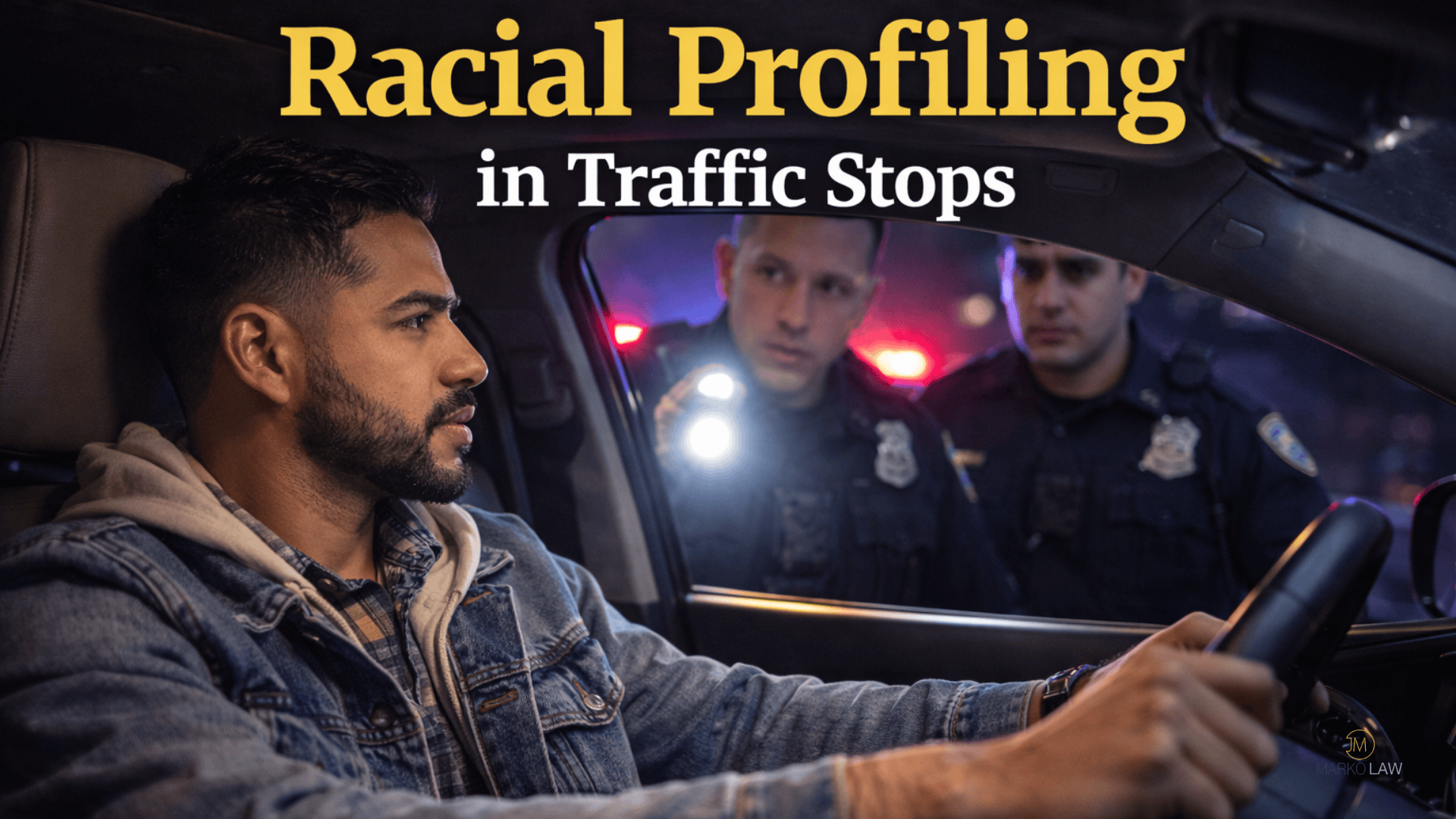Motorcycles offer freedom, adrenaline, and a connection to the road that cars just can’t match. But that freedom comes with risk—and in Michigan, one fall can cost you everything.
It doesn’t take a high-speed crash to change your life. A quick swerve to avoid a pothole. A car that cuts you off without looking. A patch of gravel on a turn. Suddenly, you’re on the pavement, your bike is down, and your body is in pain. For riders, the question isn’t if you’ll fall—it’s when. And when that moment comes, will you be ready?
At Marko Law, we’ve represented riders who were blamed for accidents they didn’t cause, denied coverage they paid for, and left fighting uphill battles because they chose two wheels instead of four. The system doesn’t always protect bikers. In fact, it often works against them.
That’s why knowing the law is just as important as wearing a helmet.
The Real Danger of Motorcycle Falls
Motorcycle Crash Trends in Michigan
- In 2023, Michigan recorded 3,056 motorcycle‑involved crashes, including 164 fatal crashes. (Michigan Traffic Crash Facts)
- In 2022, there were 3,158 crashes involving motorcycles; 173 motorcyclists died, and 817 were seriously injured. (Christensen Law)
- Despite making up around 1% of all traffic crashes, motorcyclists account for a disproportionate share of fatalities and serious injuries. (Michigan Traffic Crash Facts)
Common Causes of Falls & Wipeouts
Motorcycle crashes aren’t always dramatic collisions. Many start with seemingly minor slipping or loss of control:
- Loose gravel or sand on a curve or shoulder, causing a wheel to lose traction
- Potholes, road defects, cracked pavement, or uneven surfaces
- Distracted motorists who swerve suddenly into your path
- Sudden stops or swerves, either by you or surrounding traffic
Injuries Even Low‑Speed Falls Can Cause
Falling off a bike at 10 or 20 mph can be devastating. Some of the typical injuries include:
- Traumatic brain injury (TBI)
- Broken bones, like wrists, arms, collarbones, legs
- Road rash, which can lead to deep tissue damage or infection
- Spinal injuries, which may cause paralysis or chronic pain
- Emotional trauma, anxiety, PTSD, and loss of quality of life
The Emotional & Financial Impact
A fall that causes even moderate injuries can set off a cascade of challenges:
- Medical costs, sometimes exceeding what basic coverage provides
- Lost income or job incapacity, especially in physically demanding work
- Long-term care or therapy, including physical, occupational, or mental health
- Emotional trauma: fear, anxiety, loss of identity, and disruption to family life
Michigan Motorcycle Laws Every Rider Should Know
Helmet Law
Michigan’s helmet law is a mix of freedom and risk.
- Riders under 21: Helmets are mandatory—no exceptions.
- Riders 21 and over: You can ride without a helmet only if you:
- Carry at least $20,000 in first-party medical benefits coverage, and
- Have had a motorcycle endorsement for at least 2 years or have passed an approved motorcycle safety course
Licensing & Endorsement Requirements
To legally ride a motorcycle in Michigan, you need a motorcycle endorsement (CY) on your driver's license. That means passing:
- A written knowledge test
- A vision test
- A skills test or completing an approved safety course
Motorcycle Insurance: What You Must Carry—and What You Don't Get
Unlike cars, motorcycles aren’t covered under Michigan’s No-Fault Insurance Act. That means:
- You must carry liability insurance (minimum $50,000 per person / $100,000 per accident for bodily injury)
- But you don’t get automatic Personal Injury Protection (PIP) benefits for your own injuries
- You’re also not covered for medical expenses unless you buy optional first-party medical benefits
If you get hit, you may need to sue the at-fault driver just to cover your hospital bills. And if you’re blamed for the crash, it gets even harder.
Lane-Splitting: Don’t Do It in Michigan
In some states, riding between lanes is legal. Not here.
Lane-splitting is illegal in Michigan. If you're in an accident while lane-splitting, it can seriously hurt your case—even if the other driver was acting recklessly.
How Fault Is Determined in Motorcycle vs. Car Crashes
Michigan follows a comparative fault system. That means:
- You can still recover damages even if you were partially at fault
- But your compensation gets reduced by your percentage of fault
- If you’re found more than 50% at fault, you lose the right to collect pain and suffering damages
Common Legal Pitfalls for Michigan Riders
Getting Blamed for Speeding or Reckless Riding
It’s a sad truth: riders are often presumed guilty. When a crash happens, drivers and even police may default to blaming the motorcyclist, claiming:
- You were speeding
- You were weaving between cars
- You “came out of nowhere”
Even without evidence, these assumptions can find their way into crash reports—and insurance adjusters latch onto them fast. That’s why preserving physical evidence, getting witness statements, and hiring legal help immediately is critical.
Bias from Police and Insurance Companies
Let’s be honest—there’s a built-in bias against motorcycle riders. Many insurance companies view bikers as “high-risk.” Some police reports subtly (or not so subtly) suggest the rider is partially to blame, even when another driver clearly caused the crash.
This bias can:
- Skew the official record of the crash
- Lead to denied or minimized claims
- Affect how a jury perceives your case
Denial of No-Fault Benefits
Here’s the legal trap: motorcycles aren’t classified as “motor vehicles” under Michigan’s No-Fault Act.
That means:
- You don’t automatically get PIP (Personal Injury Protection) benefits if you’re injured
- You’re not covered for medical expenses, lost wages, or rehab unless you’ve purchased optional medical coverage or the crash involved a car (and even then, it depends on fault and coverage tiers)
What to Do After a Fall or Crash
Get Medical Help Immediately—Even If You Think You’re Okay
Motorcycle injuries can be deceptive. You might walk away feeling “fine” and still have:
- Internal bleeding
- Concussions or brain injuries
- Fractures masked by adrenaline
- Soft tissue or spinal damage
Document Everything with Photos
If you're physically able:
- Take photos of your motorcycle from all angles
- Capture the road surface—gravel, potholes, skid marks, debris
- Photograph your visible injuries
- Snap pictures of weather conditions, signage, and surrounding vehicles
File a Police Report—Even for Minor Incidents
Some riders skip this step, especially if they think they’re not seriously hurt. That’s a mistake.
- Always call the police and get a report on file
- Make sure your side of the story is documented
- Get the name and badge number of the responding officer
Get Witness Names and Contact Info
If anyone saw the crash, get their names, phone numbers, and email addresses. Witnesses can make or break your case, especially when fault is disputed. Don’t assume the police will gather this info—get it yourself if you can.
Don’t Talk to Insurance Without Legal Counsel
The insurance rep may seem friendly, but make no mistake—they’re not on your side.
- Don’t give a recorded statement
- Don’t accept a fast settlement offer
- Don’t admit fault or speculate about what happened
Call an attorney first. At Marko Law, we’ll deal with the insurance companies for you—and we know exactly how to stop them from taking advantage of your situation.
Keep Every Record
Hold on to:
- Medical bills and treatment summaries
- ER and ambulance records
- Prescription receipts
- Physical therapy or follow-up care documents
- Time off work or lost income proof
When the Road Turns Against You, We Don’t
Your motorcycle isn’t just a vehicle—it’s your freedom, your therapy, your identity. But when that ride ends in a crash, the road to recovery can be brutal. You’re up against insurance companies, legal loopholes, and a system that often treats riders as second-class citizens.
At Marko Law, we see you. We know the risks you take every time you suit up. And when the worst happens, we don’t let the system blame you, bury you, or lowball your pain.
We fight for riders like you—and we don’t back down.
Whether it’s holding negligent drivers accountable, forcing insurance companies to pay what they owe, or going to trial to expose the truth, we’re here to make sure your fall doesn’t turn into a freefall.
Contact Marko Law for a Free Case Evaluation
📞 Phone: +1-313-777-7777
📍 Main Office: 220 W. Congress, 4th Floor, Detroit, MI 48226
🌐 Website: www.markolaw.com









.svg)








